STM32 —— 串口通信2 、中断2 STM32 中断方式串口通信(不定长已知内容或定长字符串)
STM32 —— 串口通信2 、中断2 STM32 中断方式串口通信(不定长已知内容或定长字符串)
实验目的
采用串口中断方式重做上周的串口通信作业,分别实现:
当 stm32 接收到字符 “s” 时,停止持续发送 “hello windows!” ; 当接收到字符“t”时,持续发送 “hello windows!”(提示:采用一个全局标量做信号灯)
当stm32接收到字符“stop stm32!”时,停止持续发送“hello windows!”
当接收到字符“go stm32!”时,持续发送“hello windows!”
提示:要将接收到的连续字符保存到一个字符数组里,进行判别匹配。写一个接收字符串的函数
实验原理
实验原理在我的另一篇博客中有详细的介绍:STM32 —— 串口定长数据接收
HAL 库方法
CubeMX 项目配置
设置 RCC
配置如图:
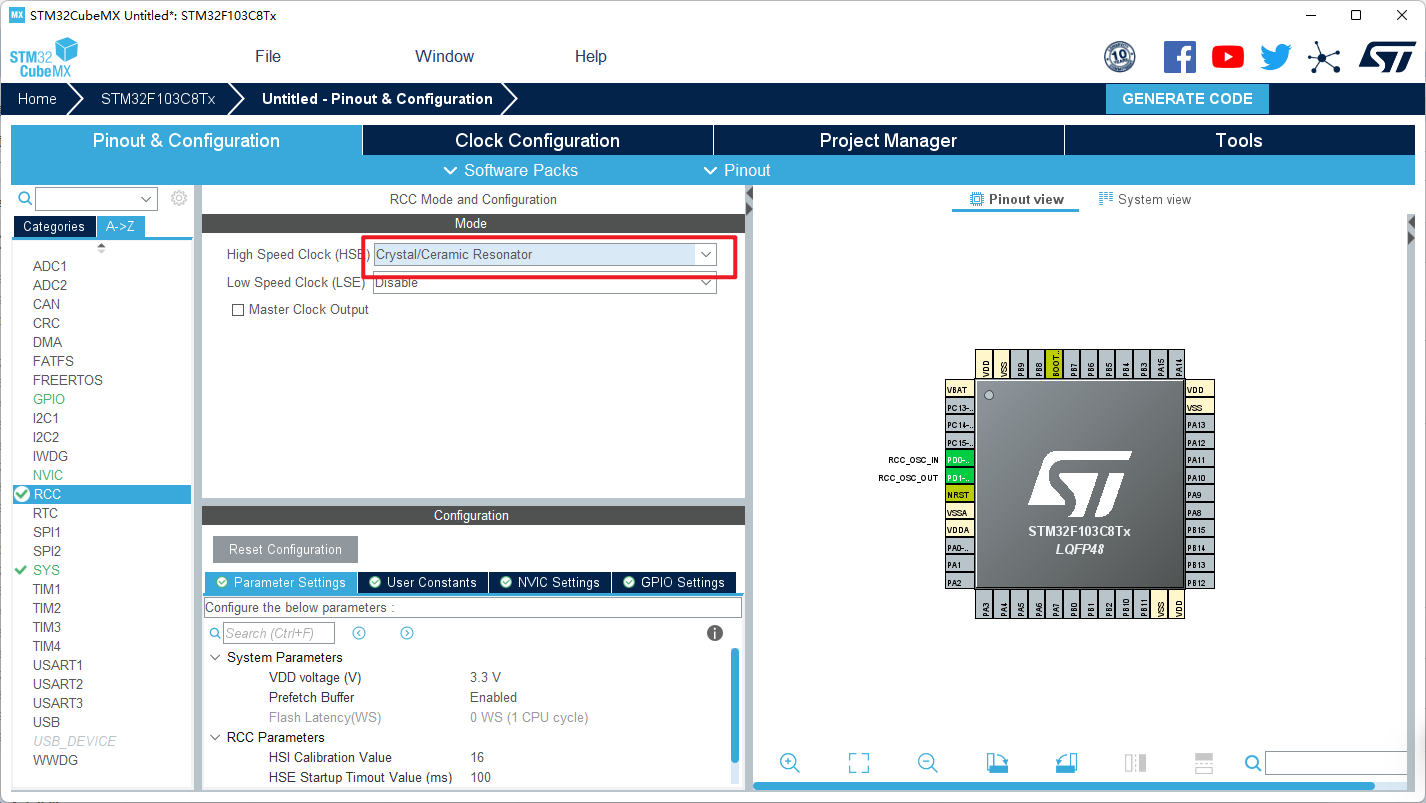
设置好外部晶振之后,需要设置时钟周期为 72 MHz
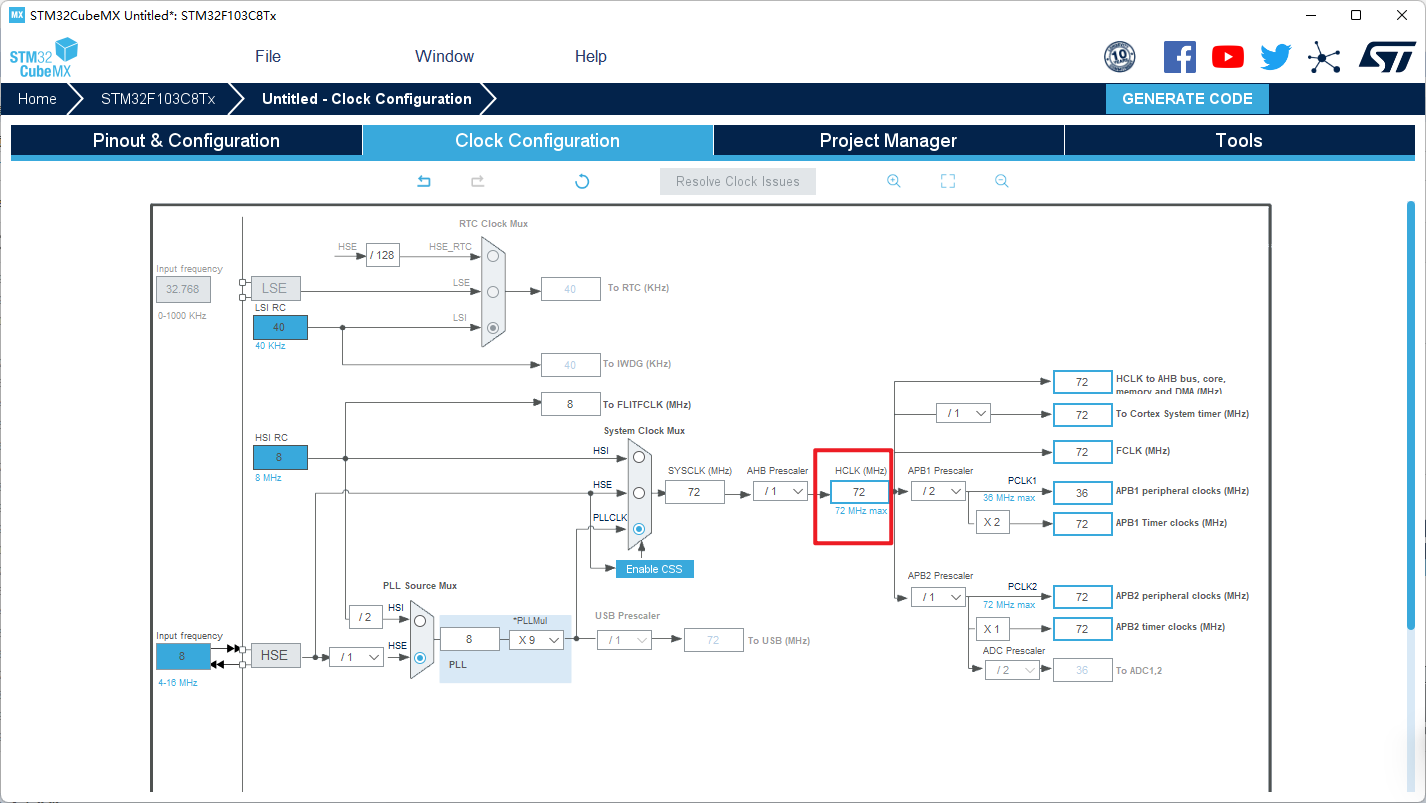
设置 SYS
用于设置并控制板载灯泡
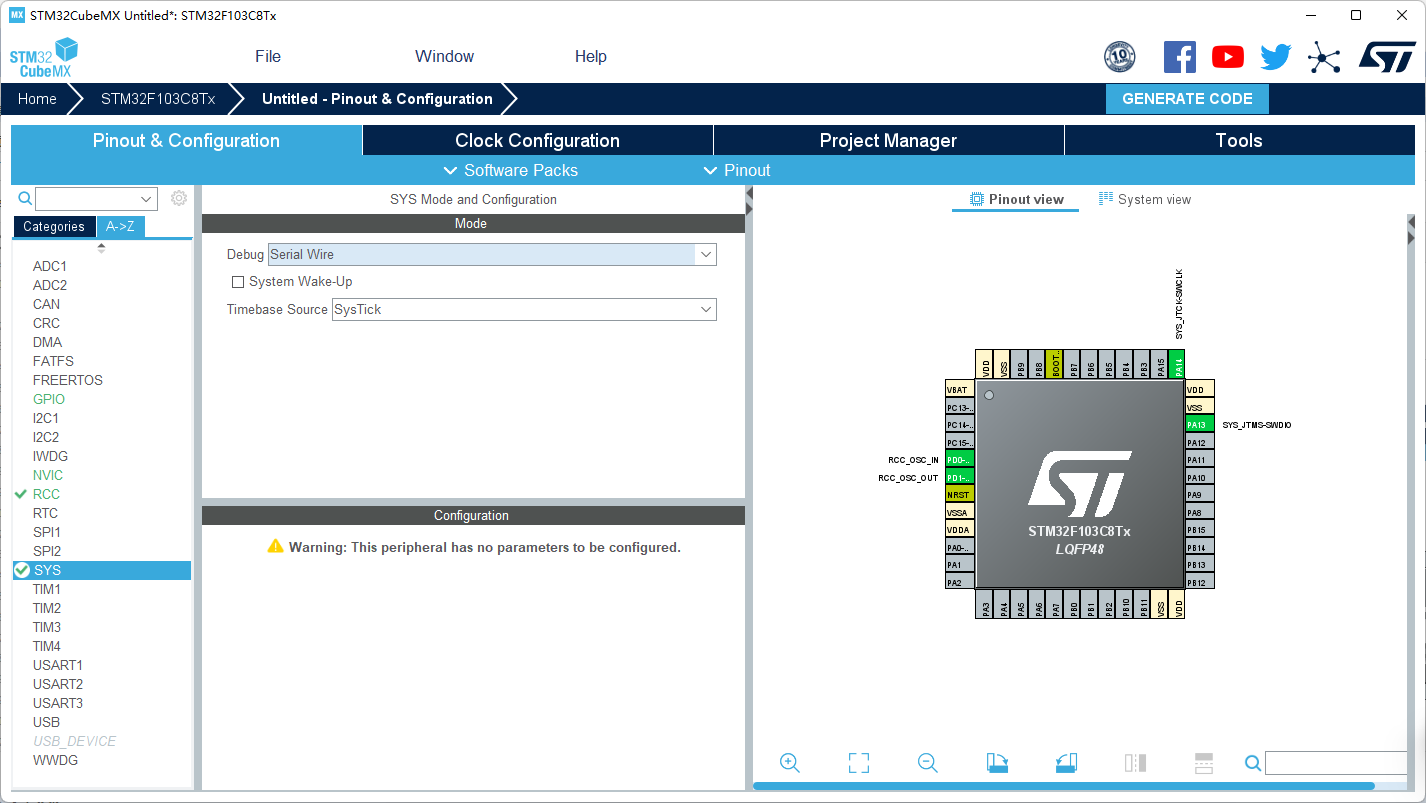
设置 USART
将串口 USART1 设置为异步通信模式
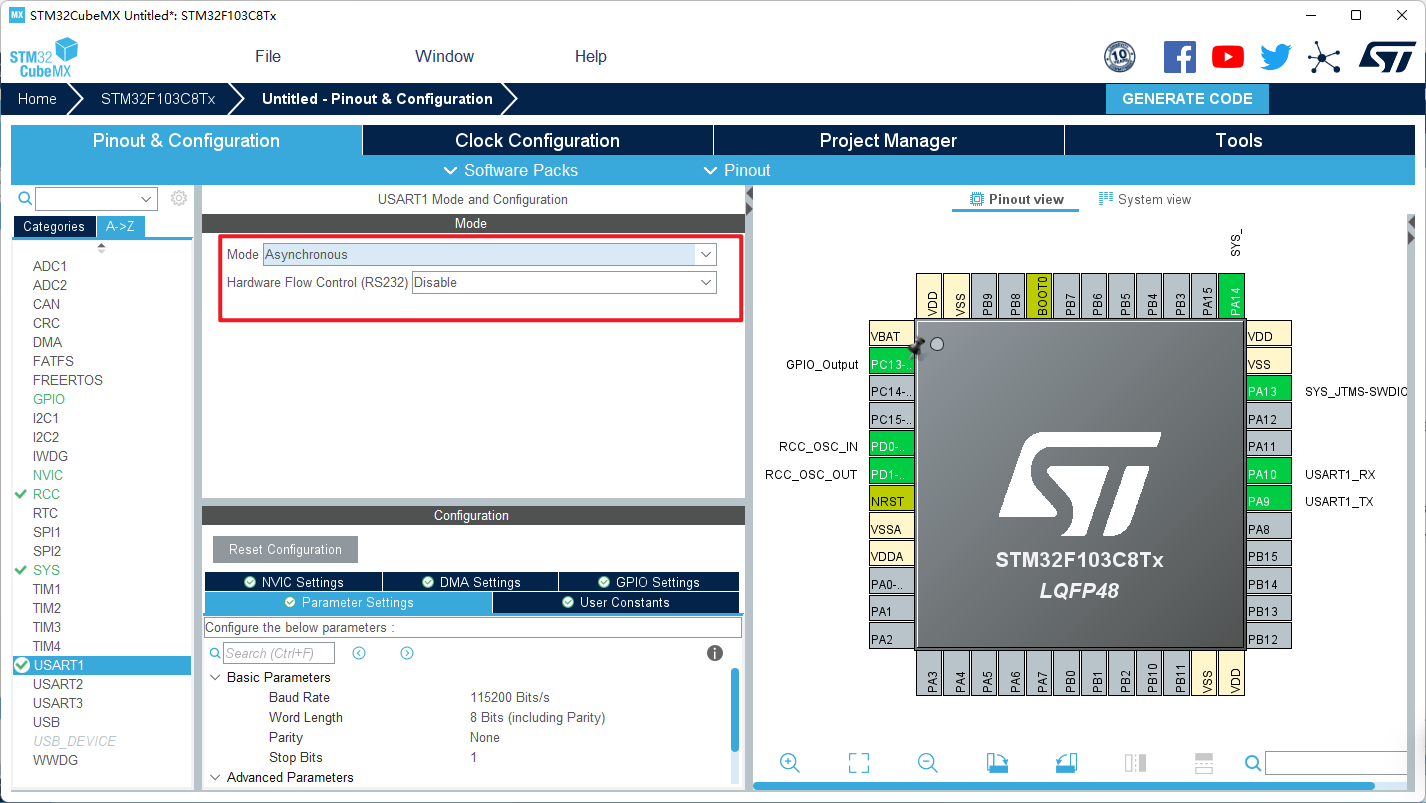
设置 NVIC
将串口 USART1 设置为默认全局中断
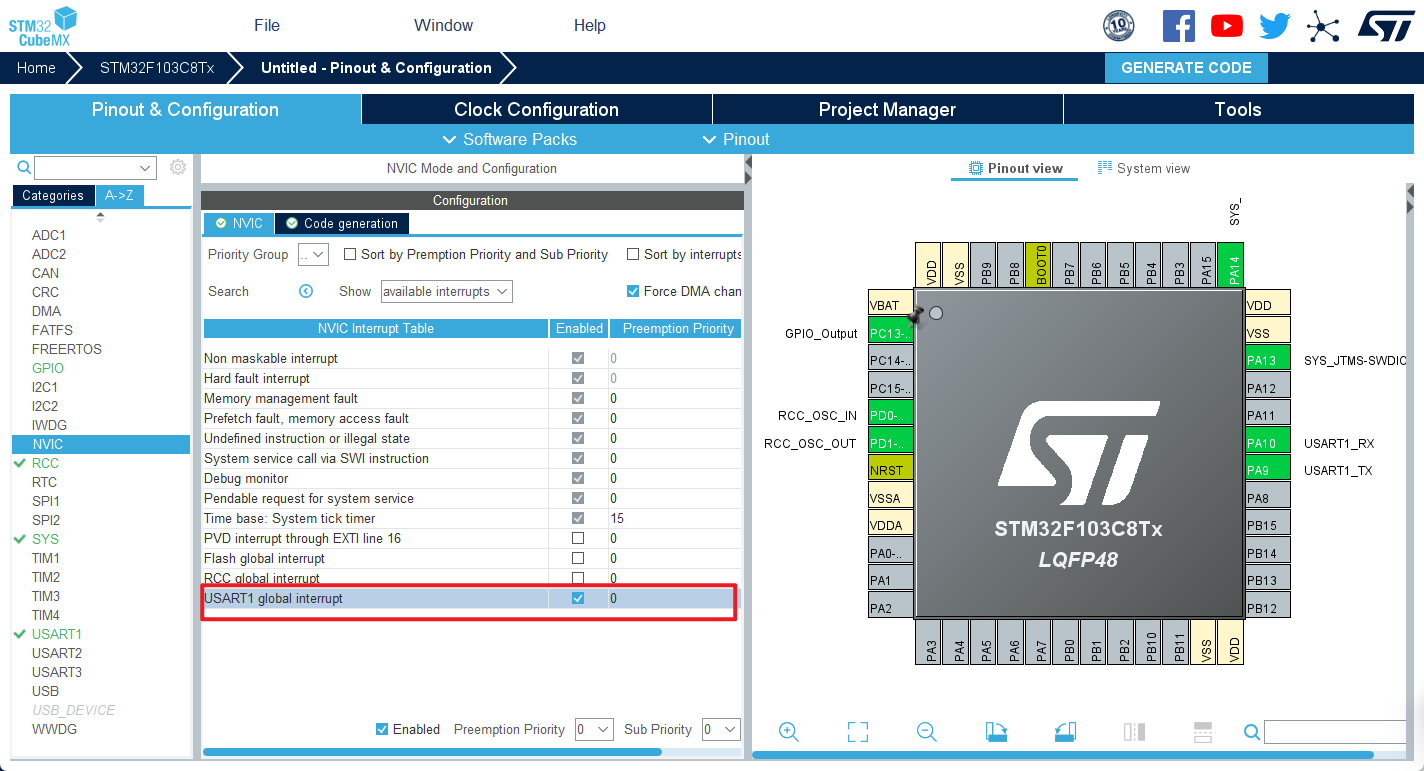
代码设计
定长字符串接收
首先,我们需要一个布尔类型变量用来判断串口是否中断,并且在输入是要向上位机发送对应的回复,所以,数据定义如下:
bool flag = false;
char c; // 输入的数据,t 是开始持续发送,s 是中断发送
uint8_t str[] = "Hello ppqppl !\r\n"; // 输出数据
uint8_t tips[] = "input error !\r\n"; // 输入错误
uint8_t stop[] = "STOP !\r\n"; // 中断发送
uint8_t start[] = "START !\r\n"; // 开始发送
注意:默认引入 bool 变量时会报错,所以,如果需要使用 bool 变量类型,需要引入头文件 stdbool.h
然后我们需要接收数据,HAL 库中已经有接收固定长度数据的函数,我们只需要直接调用即可,这里我们把串口接收函数写在主函数中的循环之前:
HAL_UART_Receive_IT(&huart1,(uint8_t *)&c,1);
// 函数的三个参数分别是:接收的串口,接收的数据,数据的长度
我们成功接收数据后,需要思考我们如何使串口产生中断,在 stm32f1xx_it.c 中我们可以找到使串口产生中断的函数:
void USART1_IRQHandler(void)
而这个函数主要是通过这个函数来执行中断事件:
void HAL_UART_IRQHandler(&huart1);
如果没有明白为什么要使用这个函数,请看我的另一篇博客:STM32 —— 串口定长数据接收
我们只需要重写这个函数即可:
void HAL_UART_RxCpltCallback(UART_HandleTypeDef *huart){
switch(c){
case 's':{
flag = false;
HAL_UART_Transmit(huart,(uint8_t *)stop,COUNTOF(stop),0xFFFF);
break;
}
case 't':{
flag = true;
HAL_UART_Transmit(huart,(uint8_t *)start,COUNTOF(start),0xFFFF);
break;
}
default:{
flag = false;
HAL_UART_Transmit(huart,(uint8_t *)tips,COUNTOF(tips),0xFFFF);
break;
}
}
HAL_UART_Receive_IT(&huart1, (uint8_t *)&c, 1); // 由于我们是根据输入来判断中断,而且要求程序可以多次输入,所以这里每次中断判断后都要重新获取 c 的值
}
最后,我们只需要在主函数的循环中加上判断即可:
if(flag)
{
HAL_UART_Transmit(&huart1,(uint8_t *)str,COUNTOF(str),0xFFFF);
HAL_Delay(500);
}
完整的 main.c 代码如下:
/* USER CODE BEGIN Header */
/**
******************************************************************************
* @file : main.c
* @brief : Main program body
******************************************************************************
* @attention
*
* Copyright (c) 2022 STMicroelectronics.
* All rights reserved.
*
* This software is licensed under terms that can be found in the LICENSE file
* in the root directory of this software component.
* If no LICENSE file comes with this software, it is provided AS-IS.
*
******************************************************************************
*/
/* USER CODE END Header */
/* Includes ------------------------------------------------------------------*/
#include "main.h"
#include "usart.h"
#include "gpio.h"
#include <stdbool.h>
/* Private includes ----------------------------------------------------------*/
/* USER CODE BEGIN Includes */
/* USER CODE END Includes */
/* Private typedef -----------------------------------------------------------*/
/* USER CODE BEGIN PTD */
/* USER CODE END PTD */
/* Private define ------------------------------------------------------------*/
/* USER CODE BEGIN PD */
/* USER CODE END PD */
/* Private macro -------------------------------------------------------------*/
/* USER CODE BEGIN PM */
/* USER CODE END PM */
/* Private variables ---------------------------------------------------------*/
/* USER CODE BEGIN PV */
/* USER CODE END PV */
/* Private function prototypes -----------------------------------------------*/
void SystemClock_Config(void);
/* USER CODE BEGIN PFP */
/* USER CODE END PFP */
/* Private user code ---------------------------------------------------------*/
/* USER CODE BEGIN 0 */
/* USER CODE END 0 */
/**
* @brief The application entry point.
* @retval int
*/
#define COUNTOF(a) (sizeof(a)/sizeof(*(a)))
bool flag = false;
char c;
uint8_t str[] = "Hello ppqppl !\r\n";
uint8_t tips[] = "input error !\r\n";
uint8_t stop[] = "STOP !\r\n";
uint8_t start[] = "START !\r\n";
void HAL_UART_RxCpltCallback(UART_HandleTypeDef *huart){
switch(c){
case 's':{
flag = false;
HAL_UART_Transmit(huart,(uint8_t *)stop,COUNTOF(stop),0xFFFF);
break;
}
case 't':{
flag = true;
HAL_UART_Transmit(huart,(uint8_t *)start,COUNTOF(start),0xFFFF);
break;
}
default:{
flag = false;
HAL_UART_Transmit(huart,(uint8_t *)tips,COUNTOF(tips),0xFFFF);
break;
}
}
HAL_UART_Receive_IT(&huart1, (uint8_t *)&c, 1);
}
int main(void)
{
/* USER CODE BEGIN 1 */
/* USER CODE END 1 */
/* MCU Configuration--------------------------------------------------------*/
/* Reset of all peripherals, Initializes the Flash interface and the Systick. */
HAL_Init();
/* USER CODE BEGIN Init */
/* USER CODE END Init */
/* Configure the system clock */
SystemClock_Config();
/* USER CODE BEGIN SysInit */
/* USER CODE END SysInit */
/* Initialize all configured peripherals */
MX_GPIO_Init();
MX_USART1_UART_Init();
/* USER CODE BEGIN 2 */
/* USER CODE END 2 */
/* Infinite loop */
/* USER CODE BEGIN WHILE */
HAL_UART_Receive_IT(&huart1,(uint8_t *)&c,1);
while (1)
{
if(flag){
HAL_UART_Transmit(&huart1,(uint8_t *)str,COUNTOF(str),0xFFFF);
HAL_Delay(500);
}
/* USER CODE END WHILE */
/* USER CODE BEGIN 3 */
}
/* USER CODE END 3 */
}
/**
* @brief System Clock Configuration
* @retval None
*/
void SystemClock_Config(void)
{
RCC_OscInitTypeDef RCC_OscInitStruct = {0};
RCC_ClkInitTypeDef RCC_ClkInitStruct = {0};
/** Initializes the RCC Oscillators according to the specified parameters
* in the RCC_OscInitTypeDef structure.
*/
RCC_OscInitStruct.OscillatorType = RCC_OSCILLATORTYPE_HSE;
RCC_OscInitStruct.HSEState = RCC_HSE_ON;
RCC_OscInitStruct.HSEPredivValue = RCC_HSE_PREDIV_DIV1;
RCC_OscInitStruct.HSIState = RCC_HSI_ON;
RCC_OscInitStruct.PLL.PLLState = RCC_PLL_ON;
RCC_OscInitStruct.PLL.PLLSource = RCC_PLLSOURCE_HSE;
RCC_OscInitStruct.PLL.PLLMUL = RCC_PLL_MUL9;
if (HAL_RCC_OscConfig(&RCC_OscInitStruct) != HAL_OK)
{
Error_Handler();
}
/** Initializes the CPU, AHB and APB buses clocks
*/
RCC_ClkInitStruct.ClockType = RCC_CLOCKTYPE_HCLK|RCC_CLOCKTYPE_SYSCLK
|RCC_CLOCKTYPE_PCLK1|RCC_CLOCKTYPE_PCLK2;
RCC_ClkInitStruct.SYSCLKSource = RCC_SYSCLKSOURCE_PLLCLK;
RCC_ClkInitStruct.AHBCLKDivider = RCC_SYSCLK_DIV1;
RCC_ClkInitStruct.APB1CLKDivider = RCC_HCLK_DIV2;
RCC_ClkInitStruct.APB2CLKDivider = RCC_HCLK_DIV1;
if (HAL_RCC_ClockConfig(&RCC_ClkInitStruct, FLASH_LATENCY_2) != HAL_OK)
{
Error_Handler();
}
}
/* USER CODE BEGIN 4 */
/* USER CODE END 4 */
/**
* @brief This function is executed in case of error occurrence.
* @retval None
*/
void Error_Handler(void)
{
/* USER CODE BEGIN Error_Handler_Debug */
/* User can add his own implementation to report the HAL error return state */
__disable_irq();
while (1)
{
}
/* USER CODE END Error_Handler_Debug */
}
#ifdef USE_FULL_ASSERT
/**
* @brief Reports the name of the source file and the source line number
* where the assert_param error has occurred.
* @param file: pointer to the source file name
* @param line: assert_param error line source number
* @retval None
*/
void assert_failed(uint8_t *file, uint32_t line)
{
/* USER CODE BEGIN 6 */
/* User can add his own implementation to report the file name and line number,
ex: printf("Wrong parameters value: file %s on line %d\r\n", file, line) */
/* USER CODE END 6 */
}
#endif /* USE_FULL_ASSERT */
不定长已知内容字符串接收
原理与上面类似,知识每次接收一个字符,然后讲字符存储到字符串中,每次中断都进行比对,当比对成功,通过判断改变 bool 变量的值,从而影响输出
主要代码如下
#define COUNTOF(a)(sizeof(a)/sizeof(*(a)))
char getBuffer[100];
char value;
char str1[] = "go ppqppl!";
char str2[] = "stop ppqppl!";
uint8_t out1[] = "start!\r\n";
uint8_t out2[] = "stop!\r\n";
uint8_t str[] = "Hello ppqppl!\r\n";
bool flag = false;
int countofGetBuffer = 0;
void USART1_IRQHandler(void)
{
HAL_UART_IRQHandler(&huart1); //该函数会清空中断标志,取消中断使能,并间接调用回调函数
getBuffer[countofGetBuffer++] = value;
if(strcmp(str1,getBuffer) == 0) // 这里把判断长度改为判断内容
{
HAL_UART_Transmit(&huart1,(uint8_t *)out1,COUNTOF(out1),0xFFFF);
flag = true;
countofGetBuffer = 0;
memset(getBuffer,0,COUNTOF(getBuffer));
}
else if(strcmp(str2,getBuffer) == 0)
{
flag = false;
HAL_UART_Transmit(&huart1,(uint8_t *)out2,COUNTOF(out2),0xFFFF);
HAL_Delay(500);
countofGetBuffer = 0;
memset(getBuffer,0,COUNTOF(getBuffer));
}
HAL_UART_Receive_IT(&huart1, (uint8_t *)&value,1); //由于接收中断是每接收一个字符便进入一次,所以这一行代码必须添加,否则只能接收一个字符,而无法接收整个字符串
}
注意:这里再重写函数是需要将 stm32f1xx_it.c 中的函数删掉,否则会出现重定义的报错
完整的 main.c 代码如下:
/* USER CODE BEGIN Header */
/**
******************************************************************************
* @file : main.c
* @brief : Main program body
******************************************************************************
* @attention
*
* Copyright (c) 2022 STMicroelectronics.
* All rights reserved.
*
* This software is licensed under terms that can be found in the LICENSE file
* in the root directory of this software component.
* If no LICENSE file comes with this software, it is provided AS-IS.
*
******************************************************************************
*/
/* USER CODE END Header */
/* Includes ------------------------------------------------------------------*/
#include "main.h"
#include "usart.h"
#include "gpio.h"
#include <stdbool.h>
#include <string.h>
/* Private includes ----------------------------------------------------------*/
/* USER CODE BEGIN Includes */
/* USER CODE END Includes */
/* Private typedef -----------------------------------------------------------*/
/* USER CODE BEGIN PTD */
/* USER CODE END PTD */
/* Private define ------------------------------------------------------------*/
/* USER CODE BEGIN PD */
/* USER CODE END PD */
/* Private macro -------------------------------------------------------------*/
/* USER CODE BEGIN PM */
/* USER CODE END PM */
/* Private variables ---------------------------------------------------------*/
/* USER CODE BEGIN PV */
/* USER CODE END PV */
/* Private function prototypes -----------------------------------------------*/
void SystemClock_Config(void);
/* USER CODE BEGIN PFP */
/* USER CODE END PFP */
/* Private user code ---------------------------------------------------------*/
/* USER CODE BEGIN 0 */
/* USER CODE END 0 */
/**
* @brief The application entry point.
* @retval int
*/
#define COUNTOF(a)(sizeof(a)/sizeof(*(a)))
char getBuffer[100];
char value;
char str1[] = "go ppqppl!";
char str2[] = "stop ppqppl!";
uint8_t out1[] = "start!\r\n";
uint8_t out2[] = "stop!\r\n";
uint8_t str[] = "Hello ppqppl!\r\n";
bool flag = false;
int countofGetBuffer = 0;
void USART1_IRQHandler(void)
{
HAL_UART_IRQHandler(&huart1); //该函数会清空中断标志,取消中断使能,并间接调用回调函数
getBuffer[countofGetBuffer++] = value;
if(strcmp(str1,getBuffer) == 0) // 这里把判断长度改为判断内容
{
HAL_UART_Transmit(&huart1,(uint8_t *)out1,COUNTOF(out1),0xFFFF);
flag = true;
countofGetBuffer = 0;
memset(getBuffer,0,COUNTOF(getBuffer));
}
else if(strcmp(str2,getBuffer) == 0)
{
flag = false;
HAL_UART_Transmit(&huart1,(uint8_t *)out2,COUNTOF(out2),0xFFFF);
HAL_Delay(500);
countofGetBuffer = 0;
memset(getBuffer,0,COUNTOF(getBuffer));
}
HAL_UART_Receive_IT(&huart1, (uint8_t *)&value,1); //由于接收中断是每接收一个字符便进入一次,所以这一行代码必须添加,否则只能接收一个字符,而无法接收整个字符串
}
int main(void)
{
/* USER CODE BEGIN 1 */
/* USER CODE END 1 */
/* MCU Configuration--------------------------------------------------------*/
/* Reset of all peripherals, Initializes the Flash interface and the Systick. */
HAL_Init();
/* USER CODE BEGIN Init */
/* USER CODE END Init */
/* Configure the system clock */
SystemClock_Config();
/* USER CODE BEGIN SysInit */
/* USER CODE END SysInit */
/* Initialize all configured peripherals */
MX_GPIO_Init();
MX_USART1_UART_Init();
/* USER CODE BEGIN 2 */
/* USER CODE END 2 */
/* Infinite loop */
/* USER CODE BEGIN WHILE */
HAL_UART_Receive_IT(&huart1,(uint8_t *)&value,1);
while (1)
{
if(flag){
HAL_UART_Transmit(&huart1,(uint8_t *)str,COUNTOF(str),0xFFFF);
HAL_Delay(500);
}
/* USER CODE END WHILE */
/* USER CODE BEGIN 3 */
}
/* USER CODE END 3 */
}
/**
* @brief System Clock Configuration
* @retval None
*/
void SystemClock_Config(void)
{
RCC_OscInitTypeDef RCC_OscInitStruct = {0};
RCC_ClkInitTypeDef RCC_ClkInitStruct = {0};
/** Initializes the RCC Oscillators according to the specified parameters
* in the RCC_OscInitTypeDef structure.
*/
RCC_OscInitStruct.OscillatorType = RCC_OSCILLATORTYPE_HSE;
RCC_OscInitStruct.HSEState = RCC_HSE_ON;
RCC_OscInitStruct.HSEPredivValue = RCC_HSE_PREDIV_DIV1;
RCC_OscInitStruct.HSIState = RCC_HSI_ON;
RCC_OscInitStruct.PLL.PLLState = RCC_PLL_ON;
RCC_OscInitStruct.PLL.PLLSource = RCC_PLLSOURCE_HSE;
RCC_OscInitStruct.PLL.PLLMUL = RCC_PLL_MUL9;
if (HAL_RCC_OscConfig(&RCC_OscInitStruct) != HAL_OK)
{
Error_Handler();
}
/** Initializes the CPU, AHB and APB buses clocks
*/
RCC_ClkInitStruct.ClockType = RCC_CLOCKTYPE_HCLK|RCC_CLOCKTYPE_SYSCLK
|RCC_CLOCKTYPE_PCLK1|RCC_CLOCKTYPE_PCLK2;
RCC_ClkInitStruct.SYSCLKSource = RCC_SYSCLKSOURCE_PLLCLK;
RCC_ClkInitStruct.AHBCLKDivider = RCC_SYSCLK_DIV1;
RCC_ClkInitStruct.APB1CLKDivider = RCC_HCLK_DIV2;
RCC_ClkInitStruct.APB2CLKDivider = RCC_HCLK_DIV1;
if (HAL_RCC_ClockConfig(&RCC_ClkInitStruct, FLASH_LATENCY_2) != HAL_OK)
{
Error_Handler();
}
}
/* USER CODE BEGIN 4 */
/* USER CODE END 4 */
/**
* @brief This function is executed in case of error occurrence.
* @retval None
*/
void Error_Handler(void)
{
/* USER CODE BEGIN Error_Handler_Debug */
/* User can add his own implementation to report the HAL error return state */
__disable_irq();
while (1)
{
}
/* USER CODE END Error_Handler_Debug */
}
#ifdef USE_FULL_ASSERT
/**
* @brief Reports the name of the source file and the source line number
* where the assert_param error has occurred.
* @param file: pointer to the source file name
* @param line: assert_param error line source number
* @retval None
*/
void assert_failed(uint8_t *file, uint32_t line)
{
/* USER CODE BEGIN 6 */
/* User can add his own implementation to report the file name and line number,
ex: printf("Wrong parameters value: file %s on line %d\r\n", file, line) */
/* USER CODE END 6 */
}
#endif /* USE_FULL_ASSERT */
标准库方法
若有需要,后续会更新标准库写法
寄存器方法
若有需要,后续会更新寄存器写法
运行测试
虚拟串口调试
由于在调试程序时,每次修改代码后重新编译生成 hex 文件并多次烧录比较麻烦,所以这里采用仿真运行,并在 keil 中使用虚拟串口调试
调试工具下载连接:虚拟串口驱动程序_Virtual Serial Port Driver(中文和谐版)
安装好之后,我们将两个空闲串口进行绑定,这里采用将 COM3 与 COM2 进行绑定使用:
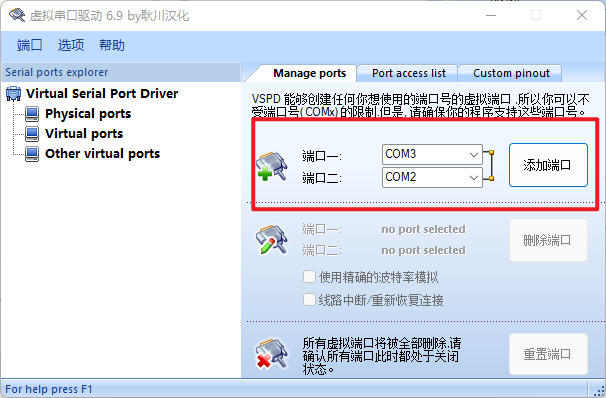
在选择好目标端口后,点击添加端口即可
如果左边已经出现了虚拟端口,就说明端口绑定成功:
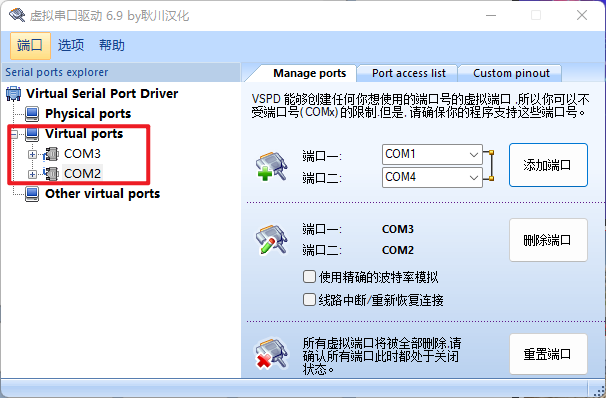
然后我们在 keil 中启动仿真运行,在左下角命令窗口输入如下命令即可绑定串口:
MODE COM2 15200,n,8,1
函数源码如下:
MODE COMx baudrate, parity, databits, stopbits
/*
COMx 表示计算机的串口
baudrate 表示串口的波特率
parity 表示校验方式,即 n 表示无校验位,0 表示偶校验,1 表示奇校验
stopbits 表示停止位长度
*/
绑定串口后,需要将计算机的串口绑定到单片机上:
ASSIGN COM2 < S3IN > S3OUT
函数源码如下:
ASSIGN COMx < SIN > SOUT
/*
COMx 表示计算机的串口
SIN 和 SOUT 表示绑定的单片机的输入和输出串口
*/
绑定如下:

绑定完全成功后,就可以使用串口调试工具进行仿真串口调试了
虚拟串口测试结果
接收单字符:
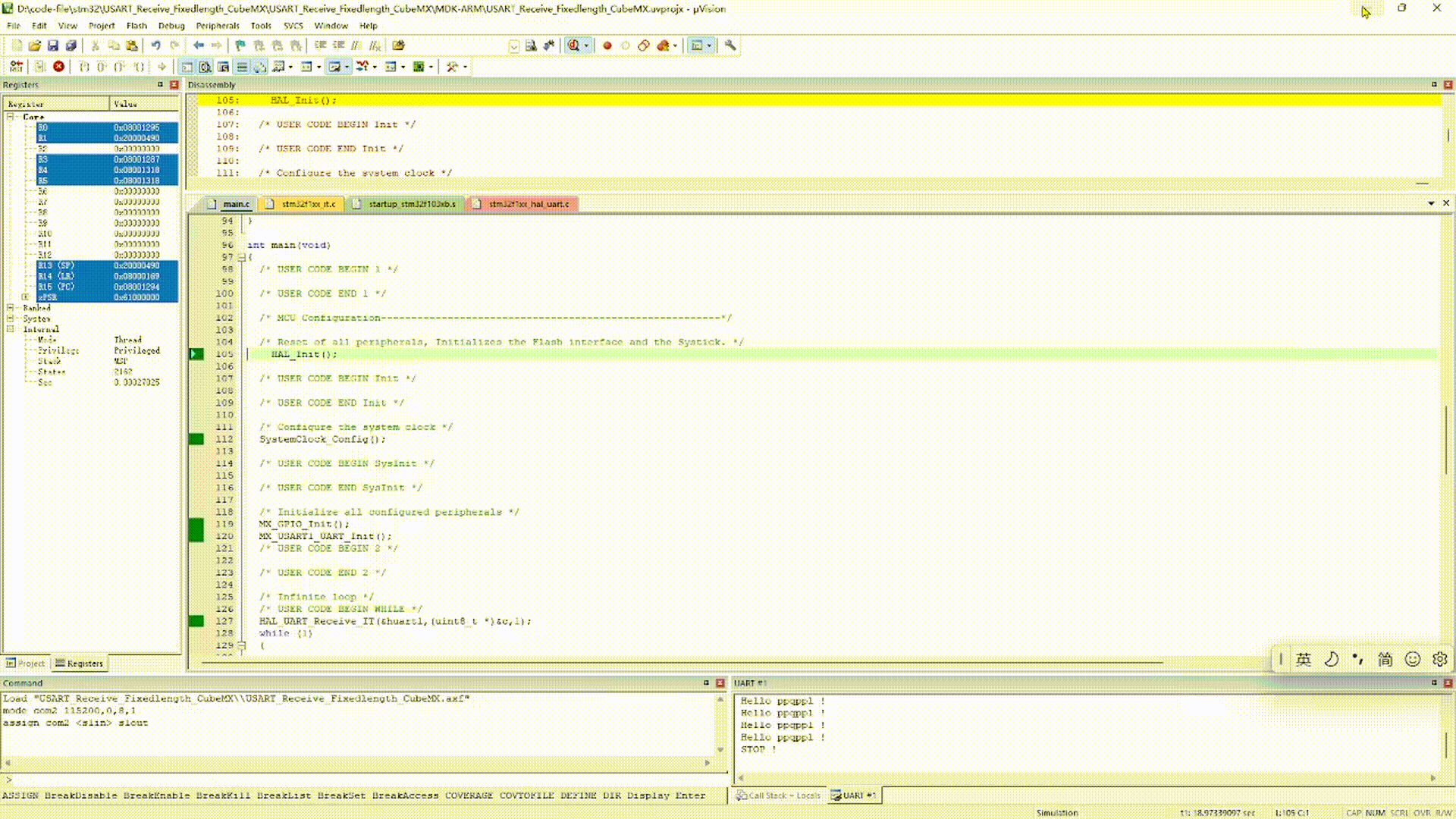
接收不定长已知内容字符串:
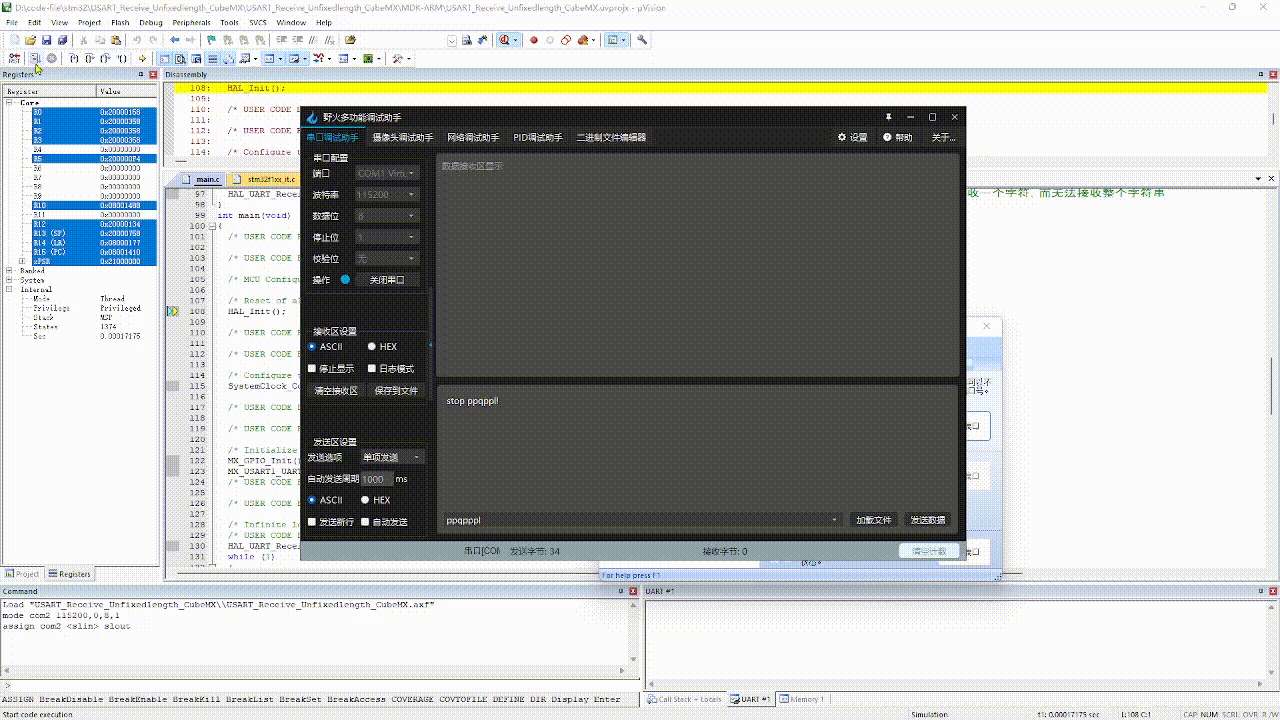
测试接收不定长已知内容字符串的时候忘记加延时了,导致上位机端接收有点小问题,加上延时之后就没问题了
接线示例
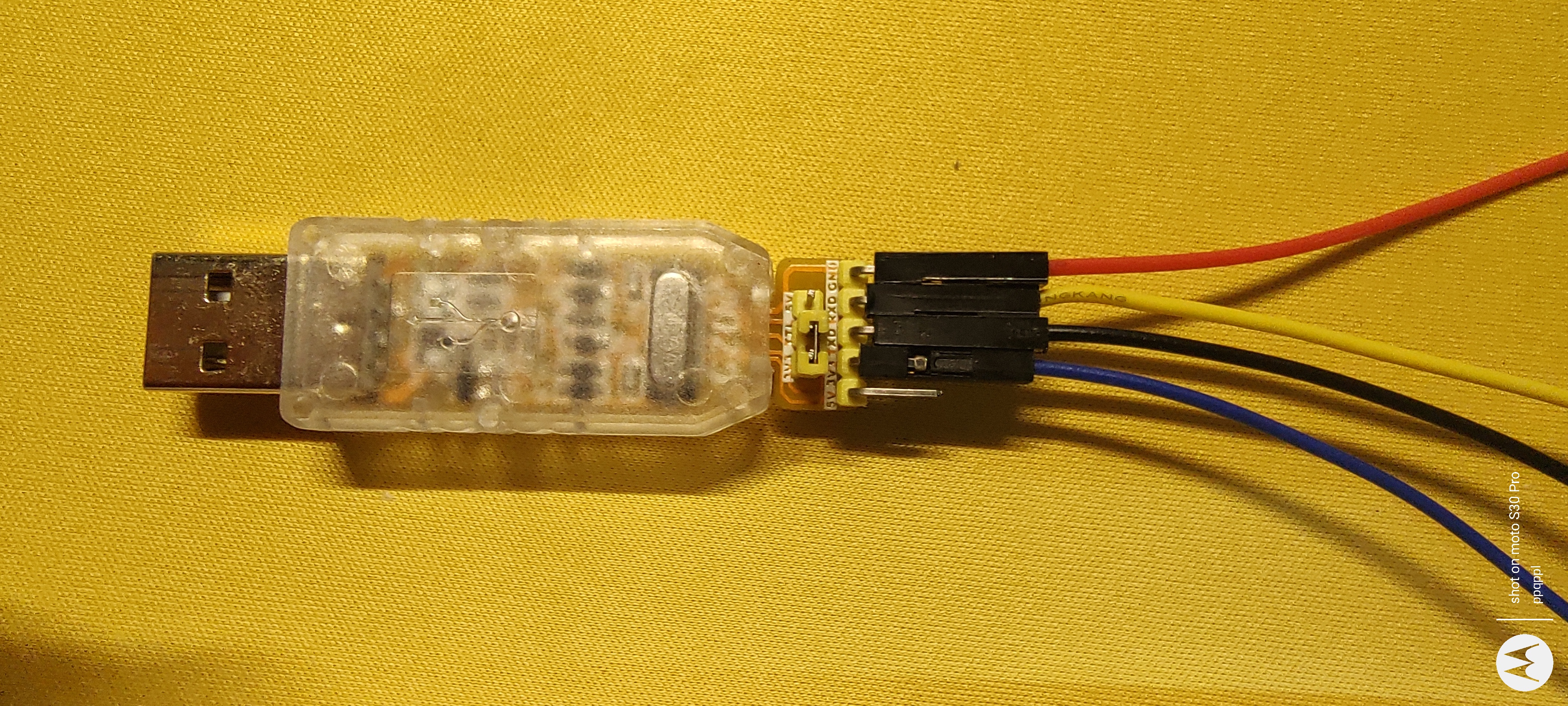
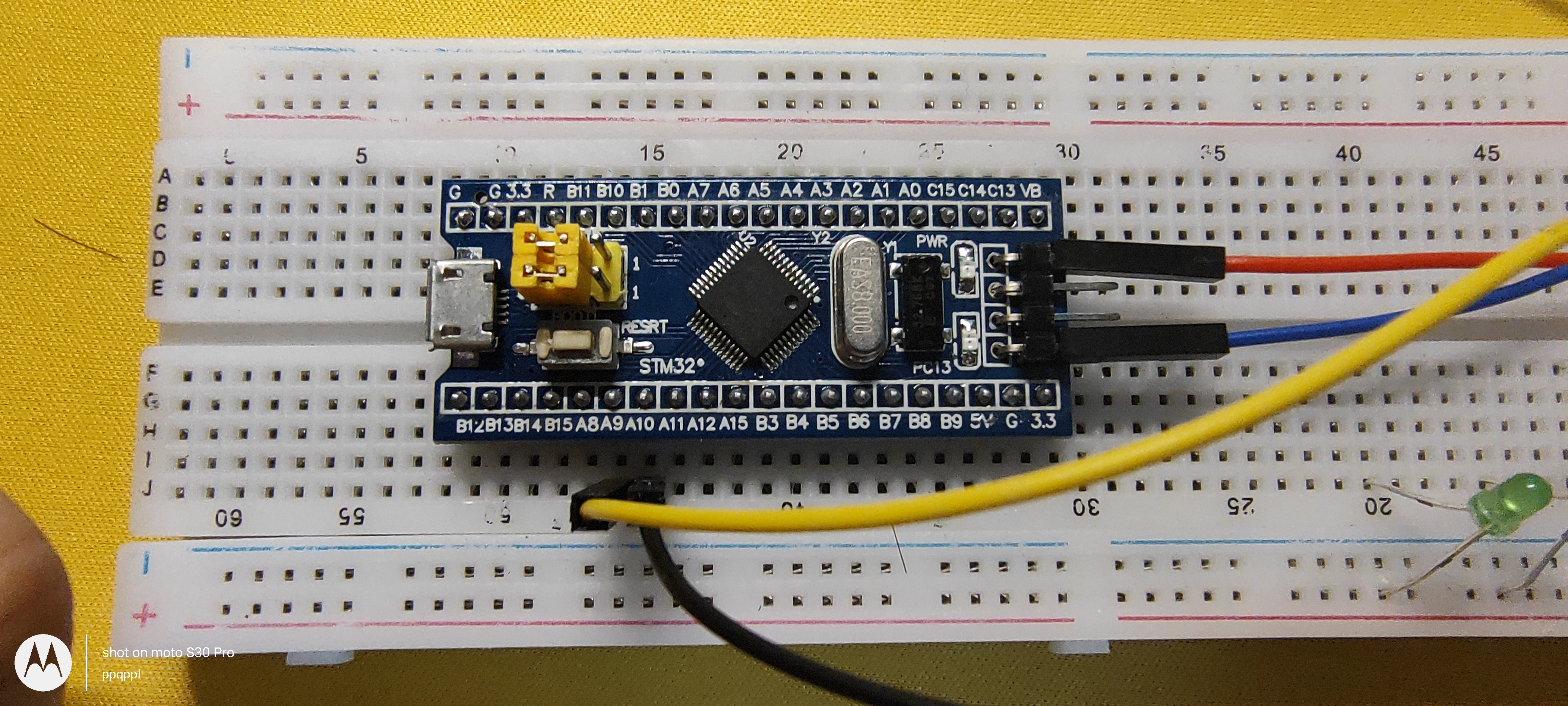
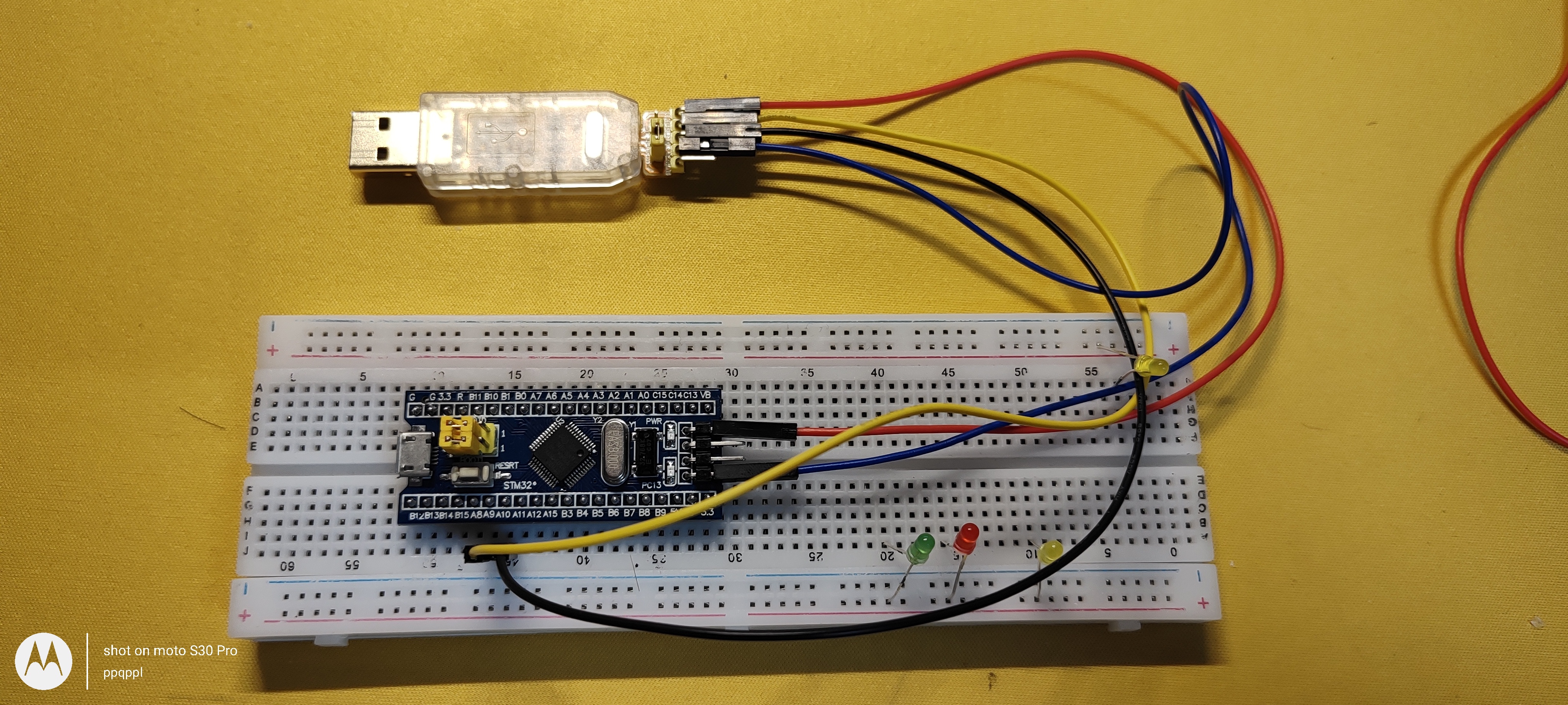
运行结果
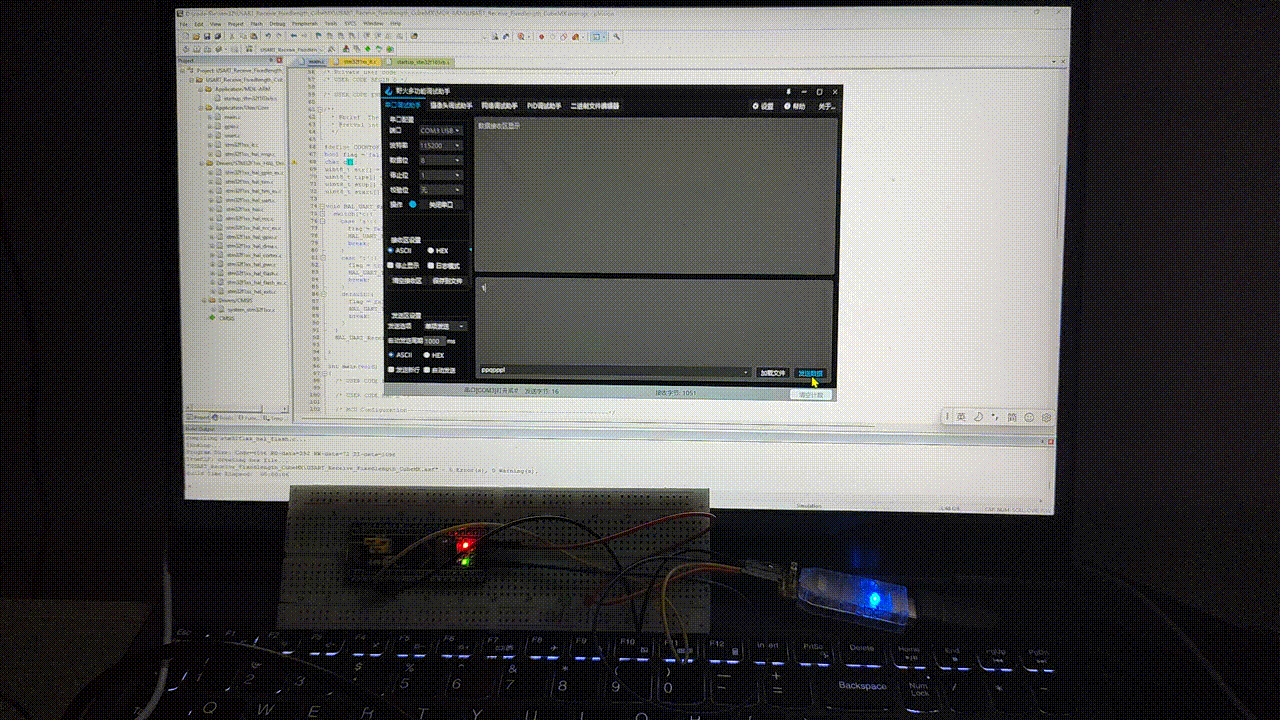
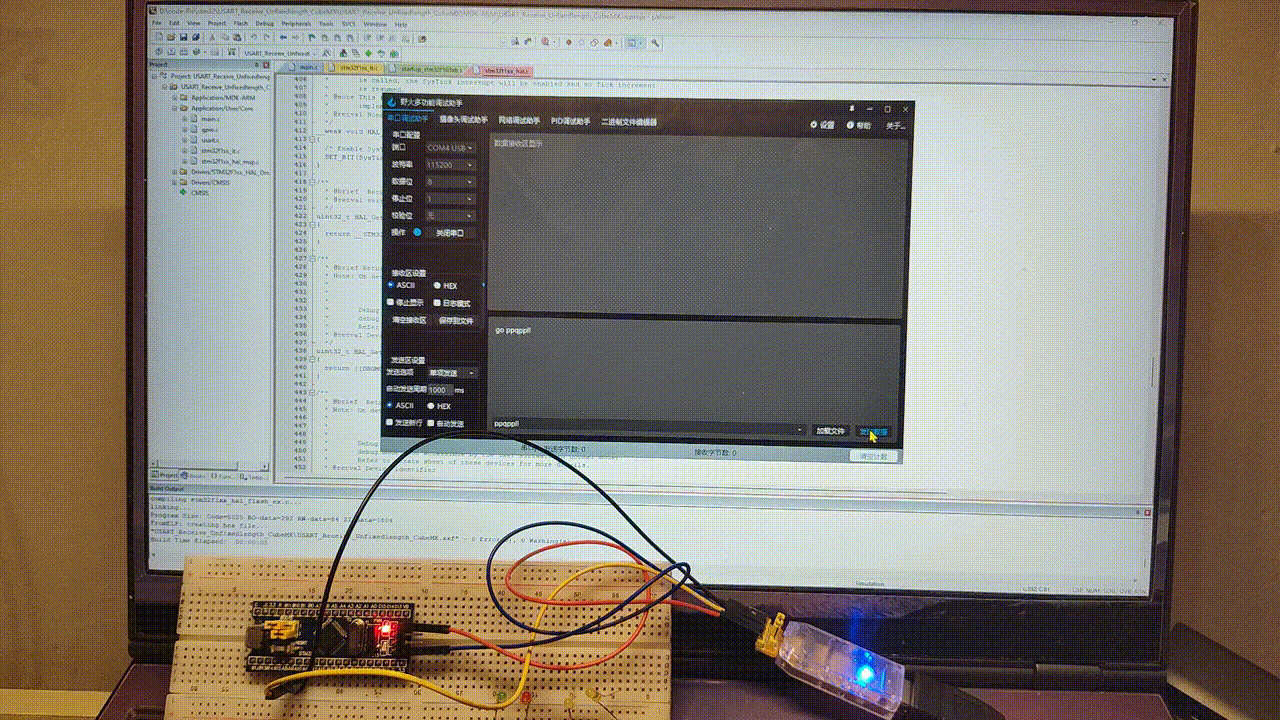
波形检测
我们通过仿真虚拟串口调试的方式进行波形检测

与串口发送 Hello Windows 波形相同,产生原因也不尽相同
错误解决方法
目前尚未发现报错,如有报错会及时更新修改方法


 浙公网安备 33010602011771号
浙公网安备 33010602011771号